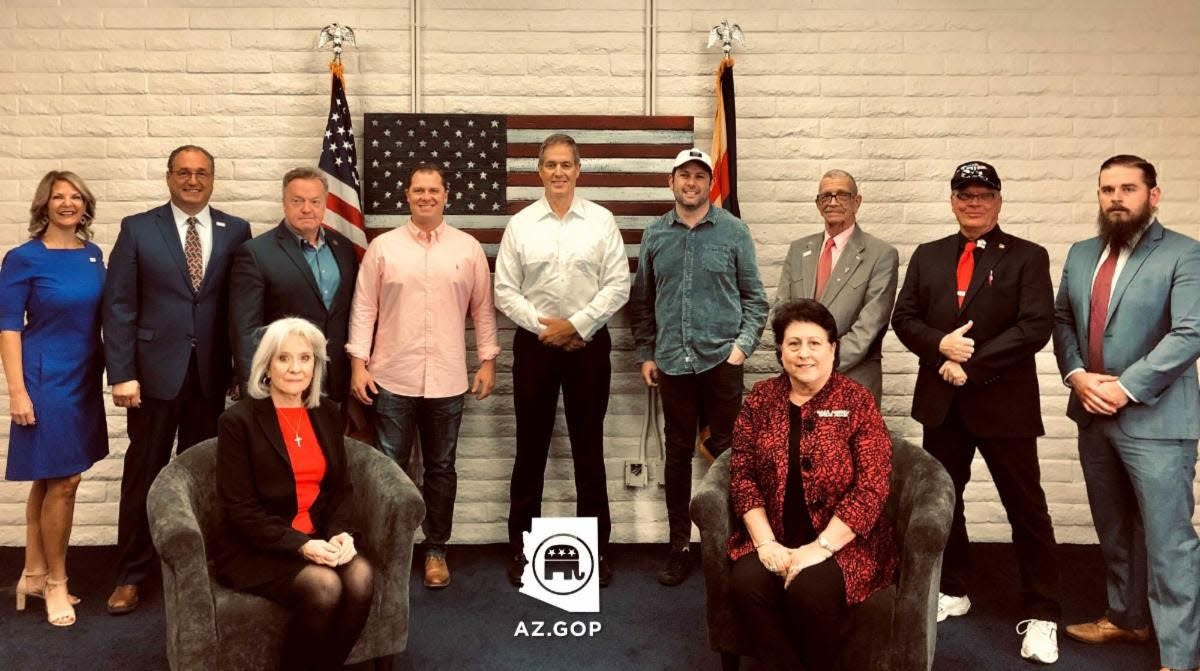Advocates for Arizona's 'fake electors' plan had legal doubts, new report finds

- Oops!Something went wrong.Please try again later.
- Oops!Something went wrong.Please try again later.
Some of those involved in submitting presidential electors for President Donald Trump in Arizona after he had lost the state in 2020 knew their plan was legally dubious and want to keep its low public profile as long as possible, according to a report published Tuesday.
Citing previously undisclosed emails, the New York Times painted the picture of an effort in key swing states, including Arizona, the closest contest in the country, that was both desperate and probably wouldn't pass legal scrutiny.
Their plan was to submit papers to Congress suggesting Trump won the states, even though certified results showed then-President-elect Joe Biden had won them. Trump's allies hoped the dual slates of electors would serve as a justification for slowing or reversing the Jan. 6, 2021, certification of Biden's victory.
After Vice President Mike Pence refused to consider the "fake electors," a pro-Trump mob stormed the U.S. Capitol, halting the process for hours.
Video: Gov. Doug Ducey with Karrin Taylor Robson and former Vice President Mike Pence
Long before then, those pushing the long shot plan knew they stood on shaky ground, the Times reported. People familiar with the plan at the time have told The Arizona Republic that while the strategy was legally questionable, they didn't view their activity as criminally wrong.
“We would just be sending in ‘fake’ electoral votes to Pence so that ‘someone’ in Congress can make an objection when they start counting votes, and start arguing that the ‘fake’ votes should be counted,” wrote Jack Wilenchik, a Phoenix lawyer who helped convene the Trump electors for Arizona.
The Dec. 8, 2020, email went to Boris Epshteyn, an adviser to Trump's campaign who served as a bridge between the Trump campaign and John Eastman, a California law professor who helped devise the legal strategy.
In a follow-up email, Wilenchik wrote that “‘alternative’ votes is probably a better term than ‘fake’ votes,” the Times reported Tuesday.
Wilenchik also seemed to acknowledge in an email that they should submit the fake electors "even though the votes aren't legal under federal law — because they're not signed by the governor."
Pence and his legal team rejected the alternate electors legal strategy even before Jan. 6, 2021.
Wilenchik and Epshteyn declined to comment about the matter to the Times and The Republic.
Wilenchik has ties to key figures involved in the Arizona Republican Party efforts to overturn the state’s 2020 presidential election results.
He represents Cyber Ninjas, the firm hired to lead the Senate’s partisan review of ballots in Maricopa County, in a months-long battle to prevent thousands of documents from public disclosure.
Wilenchik also has represented state Rep. Mark Finchem, R-Oro Valley, an election denier who led "Stop the Steal" rallies and who was outside the U.S. Capitol during the Jan. 6 riot.
Christina Bobb, a lawyer and former reporter for the conservative One America News Network, wrote an email four days after Wilenchik's, saying that Doug Mastriano, the man heading the alternate electors' effort in Pennsylvania, had been told their plan may be illegal, the Times reported.
Mastriano now is the GOP's gubernatorial nominee in that state.
The Times also reported that correspondence about the fake electors wasn't shared with the White House Counsel's Office, which had already rejected the idea as legally unsound.
Wilenchik wrote in a Dec. 8, 2020, email that Arizona Republican Party Chair Kelli Ward wanted “to keep it under wraps until Congress counts the vote Jan. 6th (so we can try to ‘surprise’ the Dems and media with it) — I tend to agree with her.”
Ward did not immediately respond to The Republic's request for comment. Last month, she and her husband, Michael, were subpoenaed by the U.S. Justice Department in connection with the alternate electors plan, according to Politico.
Paul Bender, an Arizona State University law professor who worked as deputy solicitor general in the Clinton administration, said Wilenchik's emails were troubling.
"If they are submitting documents they know are false in order to delay Congress from doing something, ... it's clearly unethical for a lawyer to do that," Bender said.
"It's different than making invalid arguments," he said. "If you submit a document that you know is not what it purports to be, that strikes me as not only unethical but probably criminal as well."
Arizona's would-be Trump electors met at the state GOP headquarters and signed the paperwork to submit to Congress on Dec. 14, 2020. They tweeted about their effort, which included a video of them taking part.
All of Arizona's Republican slate of electors participated in the effort.
They included:
Tyler Bowyer, a top executive with Turning Point USA and a committeeman for the Republican National Committee; Nancy Cottle, who chaired the Arizona Trump electors; Jake Hoffman, a state representative; Anthony Kern, a former state representative now running for the state Senate; Jim Lamon, a U.S. Senate candidate; Robert Montgomery, chair of the Cochise County Republican Committee; Samuel Moorhead, second vice chair of the Gila County Republican Party; Loraine Pellegrino, the secretary of the Arizona Trump electors; Greg Safsten, executive director of the Arizona Republican Party; Ward, the state GOP chair; and Michael Ward, Kelli Ward's husband and a GOP activist.
Republic reporter Robert Anglen contributed to this report.
Reach the reporter Ronald J. Hansen at ronald.hansen@arizonarepublic.com or 602-444-4493. Follow him on Twitter @ronaldjhansen.
Support local journalism. Subscribe to azcentral.com today.
Subscribe to our free political podcast, The Gaggle.
This article originally appeared on Arizona Republic: Report shows Arizona electors knew of 'fake election' legal doubts

